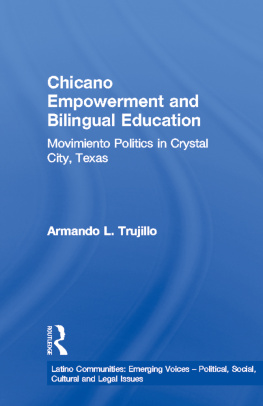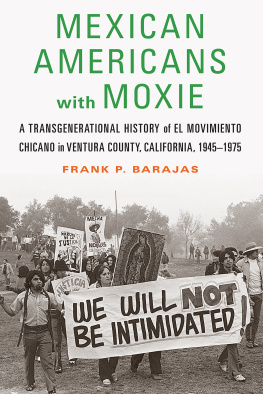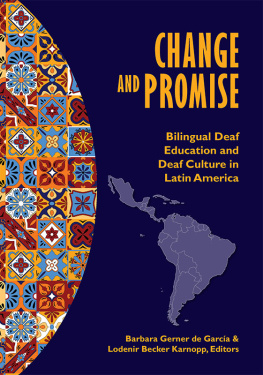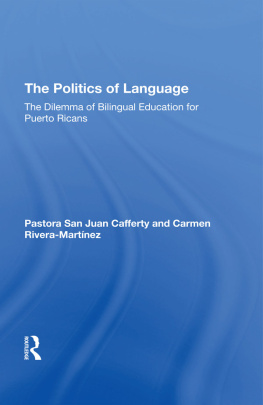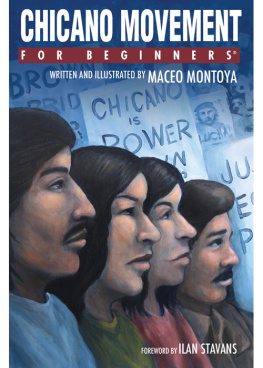First published by Garland Publishing, Inc.
This edition published 2011 by Routledge
Routledge
Taylor & Francis Group
711 Third Avenue
New York, NY 10017
Routledge
Taylor & Francis Group
2 Park Square, Milton Park
Abingdon, Oxon OX14 4RN
Copyright 1998 Armando L. Trujillo All rights reserved
Library of Congress Cataloging-in-Publication Data
Trujillo, Armando L.
Chicano empowerment and bilingual education : movimiento politics in Crystal City, Texas / Armando L. Trujillo.
p. cm. (Latino communities)
Includes bibliographical references and index.
ISBN 0-8153-3169-X (alk. paper)
1. Mexican AmericansEducationTexasCrystal City. 2. Education, BilingualTexasCrystal City. 3. Mexican AmericansTexasCrystal CityPolitics and government. I. Title. II. Series.
LC2688.C79T78 1998
370.117509764437dc21
98-28626
I have a long-standing interest in education as an avenue to social mobility and community empowerment. Reflecting on my childhood, I remember my parents, especially my mother, encouraging me to pursue further education. She would send me off to school even when I was feeling ill, always stressing that it was important that I not miss any days. She still has the perfect attendance certificates awarded me for each of my years in elementary school. As members of the Mexicano laboring community, they knew from experience that acquiring more schooling meant liberation from a destiny of agricultural manual labor. Being the youngest of six siblings was advantageous as it improved my chance of completing my schooling. When I graduated from high school, my earning power to contribute to the household budget was not as imperative as it had been for my brothers and sisters. This facilitated my opportunity to pursue post-secondary education.
I attended the University of Texas at El Paso in the sixties and seventies, during a time of heightened student activism and struggles for relevant quality education. I became involved in the student movement, grassroots political mobilization, and the push for bilingual-bicultural education. These interests developed further when I was selected as one of 24 teacher interns in a Teacher Corps Project. This program gave us interns the opportunity to teach in a minority, low-income elementary school, organize community involvement, and pursue graduate studies. Moreover, the Teacher Corps experience strengthened my commitment to teaching and serving low-income students and families through education and community involvement.
Following the Teacher Corps, I moved to northern Colorado and worked in bilingual and migrant education until the late seventies. Initially, I worked as a teacher and later as the director of a migrant education program. In retrospect, these were very productive and rewarding years. However, this period of time was also frustrating and demoralizing. Part of the frustration stemmed from attempts to procure quality educational services for migrant students and their parents in rural school districts that were not very responsive to their needs. As migrant education director, I felt powerless in dealing with an executive board made up of seven superintendents in a cooperative educational service area. I became so frustrated and demoralized that I resigned my post as director and vowed to leave the teaching profession.
I sought refuge in a botany graduate program at the University of Northern Colorado (UNC), an attempt to reconnect to my undergraduate studies in biological sciences. As my study progressed, I developed an interest in ethnobotany and took my first course in cultural anthropology. To my surprise, I found that an anthropological framework gave me insight to broader sociocultural and political-economic systems of power that had frustrated me as an educator. The influence was so strong that I changed majors to anthropology and sought to uncover the potential gains and limitations offered by bilingual and migrant education. With my intellectual appetite renewed, I concentrated in educational anthropology and conducted a collaborative research project in a bilingual-bicultural education classroom.
While finishing my program of study at UNC, I also developed an interest in Mexican society and culture and sought to do further study abroad. I learned of a program, Becas Para Aztln, that afforded opportunities for Chicana and Chicano students to do graduate study in Mxico. The Becas Para Aztln program was the brainchild of Chicano leaders and the Raza Unida Party in the seventies. Raza Unida Party leaders were keenly aware that there was a need for trained medical doctors and social science scholars and researchers in Chicano communities. They negotiated a bilateral agreement with the Mexican government who funded the program. I was fortunate to have been awarded a scholarship enabling me to join an anthropology graduate program at the Colegio de Michoacn, Zamora, Michoacn. Studying in Mxico was fortuitous because it expanded my anthropological perspective from classroom micro studies to more regional and community-based approaches. In conjunction with the program of study at the Colegio, I developed a preliminary research project looking at Mexican labor migration and did initial fieldwork in a rural ejido community.
Upon returning to the United States, I continued my study of anthropology at the University of Texas at Austin. I followed a comprehensive program that allowed me flexibility to develop specializations in the anthropology of education renewing my interest in bilingual-bicultural education, and the anthropology of development within the American Southwest and Mexico. Both concentrations provided me the expertise to do an ethnographic community study investigating relationships between the quest for Chicano political empowerment, implementation of a bilingual-bicultural education program in Crystal City, Texas, and bilingual education policy. Having been a bilingual education educator during the seventies, this study had a long but natural progression that combined my interest in bilingual schooling, community political process, and cultural revitalization.
Numerous people and institutions have contributed to my intellectual and personal growth leading to the completion of this project. First, I am deeply indebted to the people of Cristal who shared their lives and thoughts with me, both in the schools and the community-at-large. Leaders in the school district facilitated my entry allowing me to observe in the schools and talk to teachers, staff, and administrators. Community leaders were also more that willing to respond to my probing questions recalling the numerous details of their past struggles.
This book took its initial shape as a doctoral dissertation at the University of Texas at Austin. I owe a great deal of thanks to my committee for their kind and helpful comments, criticisms, and suggestions. Dr. Douglas E. Foley, who has done extensive research on political process, schooling, and interethnic relations in South Texas, supervised the overall scope and scheme of this research. He not only helped me conceptualize the initial plan, but he loaned me his pick-up truck so I could move to the field site. While the pick-up truck was promptly returned, he had to wait years for the completion of my dissertation, however. Professor Henry A. Selby, as co-chair, provided invaluable help in constructively critiquing my work, which greatly improved the research. Dr. George M. Blanco provided inestimable assistance in evaluating, critiquing, and proofreading those portions of my study dealing with bilingual education and Spanish language expression.


